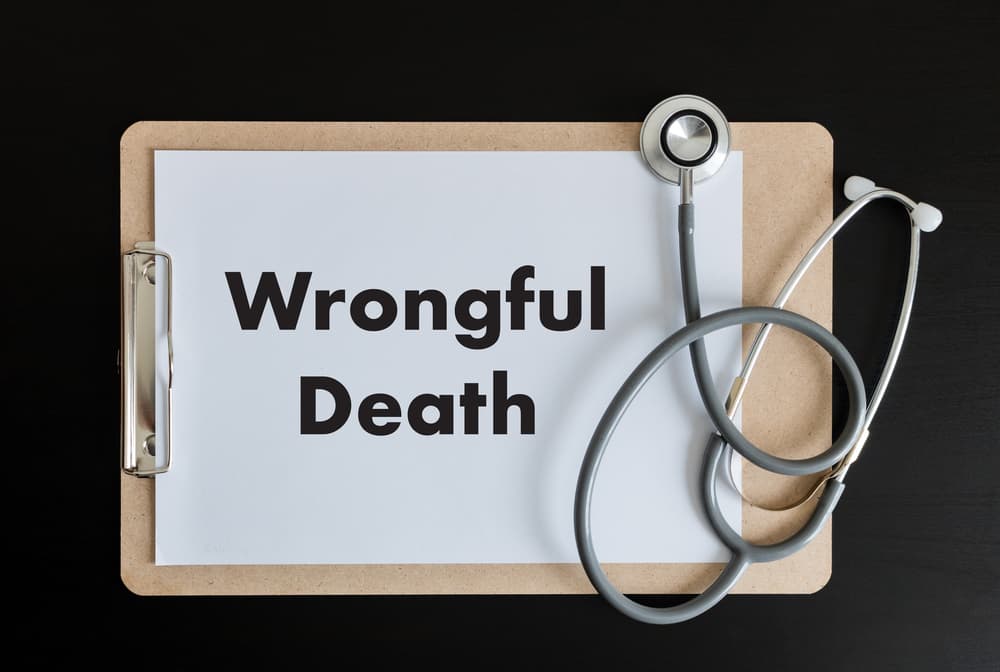Wrongful death involves a civil claim or lawsuit brought by family members and dependents against parties who knowingly or negligently caused the death of a loved one. A wrongful death cause of action allows surviving victims of wrongful death to seek compensation for financial losses and other damages resulting from the decedent's death.
Surviving families who experienced the devastating loss of their loved one to someone else's intentional or negligent actions must consult an experienced wrongful death attorney immediately to discuss legal recourse.
No one should bear the burden of economic hardship or have to learn how to navigate the legal system while grieving such loss.
Schedule a free consultation with a wrongful death lawyer on our team to discuss the circumstances of your claim. We will evaluate your case with sincerity, understanding, and compassion.
Common Wrongful Death Claims

Medical malpractice is the leading cause of wrongful death. Johns Hopkins says an estimated 795,000 Americans die or become permanently disabled annually due to diagnostic errors. Medical malpractice kills about 371,000 of those victims.
Other common causes of wrongful death claims include:
- Motor vehicle accidents (auto, motorcycle, boat, train, aviation)
- Pedestrian accidents
- Defective products
- Slip and falls
- Work accidents
- Construction accidents
- Swimming pool accidents
- Dog bites and animal attacks
- Intentional acts (assault and murder)
Accidental poisonings are another significant cause of wrongful death. The Centers for Disease Control and Prevention (CDC) reports nearly 103,000 unintentional poisoning deaths annually.
What Is the Statute of Limitations for Wrongful Death?

The wrongful death statute of limitations varies by case and state. Most states operate within two-to-three-year statutes. However, the statute of limitations for wrongful death ranges from one to six years, depending on the state of residence.
Some exceptions to the wrongful statute of limitations are as follows:
- Medical Malpractice: The statute may begin when the family discovers the cause of death to be negligent and not the actual time of the decedent's death.
- Homicide: The statute of limitations may not start until law enforcement identifies the guilty party or murderer.
- Children: It is common practice to toll the statute of limitations on children until they reach the age of majority (varies by state but usually 18).
- Government: If a government entity is at fault, the statute of limitations may decrease substantially.
Your wrongful death lawyer will clarify your state's law and other legal deadlines regarding your case.
Who Can File a Wrongful Death Claim?
Eligible wrongful death claim beneficiaries vary by state. However, most states extend the right to immediate family members before considering secondary and other potential beneficiaries.
Primary Beneficiaries
Primary beneficiaries are at the top of the general order of priority concerning eligible wrongful death claimants.
Primary beneficiaries include:
- Surviving spouses
- Domestic partners (pending jurisdiction)
- Surviving children
- Surviving parents
Living primary beneficiaries who file wrongful death actions will receive the highest percentage (if not all) of the money awarded in the claim. An experienced wrongful death lawyer will exhaustively investigate all losses before calculating damages to maximize compensation.
Secondary Beneficiaries
Secondary or contingent beneficiaries can file a wrongful death claim if a primary beneficiary doesn't file one or as a multiple-party beneficiary case with a primary claimant.
Secondary beneficiaries involve:
- Siblings
- Aunts and uncles
- Nieces and nephews
- Cousins
- Other extended family members
Many states allow multiple beneficiaries to file a wrongful death lawsuit, provided individual law firms represent them. However, some only allow one claim to be brought, while others will consolidate all claims into a single lawsuit. Ask your attorney to clarify local regulations.
Other Wrongful Death Beneficiaries
While primary and secondary beneficiaries are most typical in wrongful death claims and lawsuits, they aren't the only potential beneficiaries.
Depending on the state of governance and circumstances, additional wrongful death beneficiaries may include:
- The Executor of Estate: Another potential beneficiary in wrongful death claims is the executor or personal representative of the decedent's estate named in their will.
- Putative Spouses: People who are unknowingly in invalid marriages with the decedent —they may have married without knowing the decedent was already married or were underage at the time of the nuptials. If a putative spouse depended on the decedent, they may file a claim.
- Parents of a Deceased Fetus: If a pregnant woman suffers the negligent loss of her child in the womb, many states accept the death of a fetus as a basis for filing a wrongful death claim.
Some states allow parents to bring a wrongful death claim or lawsuit if the child was born and then died due to someone else's negligent actions, such as medical malpractice. Ask your lawyer to clarify these circumstances for you.
How Can an Experienced Wrongful Death Lawyer Help Recover Compensation?

From meeting legal deadlines to establishing liability, proving negligence, investigating your case, valuing your claim, and negotiating settlements, you need a wrongful death lawyer. An experienced attorney provides surviving victims of wrongful death a greater chance of recovering substantial compensation.
Protect You Against Insurance Companies
After your initial consultation, your wrongful death lawyer will immediately inform liable insurance companies of your representation. They cannot contact you further from this point.
Having an attorney act as a buffer between you and the insurance company protects you from those tactics. Competent lawyers won't allow them. Instead, they will demand fair compensation.
Unfortunately, insurance companies often deny or greatly undervalue claims from unrepresented wrongful death victims.
Investigating Your Wrongful Death Claim
Your lawyer will conduct a comprehensive investigation of your wrongful death claim. This can include gathering evidence, interviewing eyewitnesses, issuing subpoenas, working with experts, and analyzing the data. They'll also compile it in a presentable way for liable insurance companies (or a court if it goes to trial).
Valuing the Damages in Your Wrongful Death Claim
Valuing the damages in a wrongful death claim involves looking at income losses before the decedent's death, financial losses you've suffered since their passing, and non-economic losses, such as:
- Loss of enjoyment of life between the injury date and the decedent's death
- Pain and suffering of decedent before death
- Pain and suffering of surviving family
- Final arrangements —funeral services and burial or cremations
- Final medical expenses
- Loss of consortium (companionship, love, protection, intimacy)
- The decedent's lost income (earnings, bonuses, benefits, and future income —is assessed on projected career trajectory, including potential promotion)
- Loss of parental guidance
- Loss of household services
An experienced wrongful death attorney will assess these and any other damages before calculating a final number and sending a demand letter to the liable parties. Once received, it's time for negotiations.
Negotiating Your Settlement With Liable Insurers
Finally, an experienced wrongful death attorney will help recover compensation through the negotiation stage of the process. Negotiations typically involve multiple communications before agreeing on a settlement amount.
Most wrongful death claims are settled outside of court. However, your lawyer will represent you in court if your case goes to trial.
Hire a Wrongful Death Attorney Today
Get a free consultation with an experienced Winder personal injury attorney near you to discuss the details of your case.